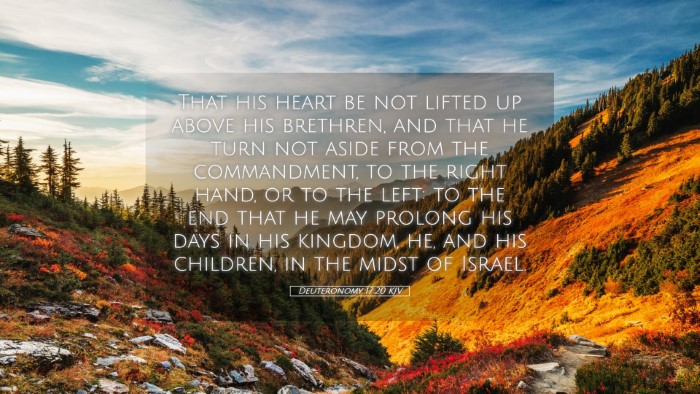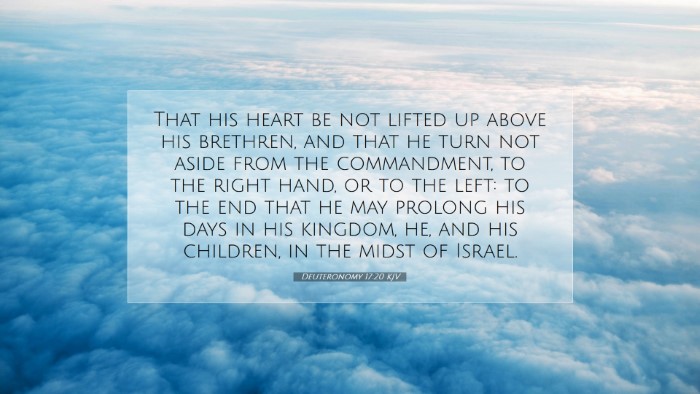Commentary on Deuteronomy 17:20
Deuteronomy 17:20 states: "That his heart may not be lifted up above his brethren, and that he turn not aside from the commandment, to the right hand or to the left: to the end that he may prolong his days in his kingdom, he, and his children, in the midst of Israel." This verse comes at the conclusion of a section discussing the appointment of a king in Israel, providing vital insights into the character and responsibilities of a ruler.
Contextual Overview
The preceding verses in Deuteronomy discuss the necessity and procedures for the establishment of a monarchy in Israel, as well as the qualifications for a king. It emphasizes the importance of a ruler whose heart remains humble and aligned with God’s commands.
The Humility of the King
- Matthew Henry: Henry emphasizes that a king is to be chosen from among the brethren, indicating the need for humility and kinship among the people of Israel. The ruler's heart should not become proud, which would lead to oppression and injustice.
- Albert Barnes: Barnes elucidates the idea that pride can lead a ruler to despise the laws that govern the nation and act in authoritarian ways. A humble and obedient king will foster respect and loyalty among his subjects.
- Adam Clarke: Clarke elaborates on the notion that humility in leadership is crucial. A king should remember his origin and maintain a heart that seeks the welfare of his people rather than elevating himself above them.
Faithfulness to the Commandments
Another critical element noted by the commentators is the king's adherence to God's commandments. Deuteronomy 17:20 warns against deviating from the law.
- Matthew Henry: Henry notes that the true measure of a king’s worth is his commitment to the statutes of God. Such obedience not only ensures personal integrity but also secures the stability of the kingdom.
- Albert Barnes: Barnes stresses that deviation from God’s commands could lead to disastrous consequences not only for the king but for the entire nation. A righteous king benefits both himself and his kingdom by keeping the commandments.
- Adam Clarke: Clarke points out that the king’s observance of God’s laws is essential for leading his people in righteousness. God’s commandments serve as a guiding framework within which the king must operate.
Implications for Longevity in Leadership
The verse concludes with the promise of prolonged days in the kingdom as a reward for such humility and fidelity to God's commands.
- Matthew Henry: He notes that longevity in leadership is often directly connected to the leader's faithfulness. A king who obeys God will find not only personal blessing but also a blessing upon his reign.
- Albert Barnes: Barnes emphasizes that the stability of leadership and the prosperity of the nation hinge upon the king’s uprightness. When a king acts righteously, it reflects positively on his lineage.
- Adam Clarke: Clarke mentions that the blessings extended to the king also encompass future generations. A leader’s faithfulness to God establishes a legacy of righteousness that can benefit his descendants.
Theological Reflections
This verse has significant implications for contemporary church and civil leaders as well. It suggests that humility, obedience to divine statutes, and the well-being of the community should characterize leadership.
Application for Modern Leaders
- Humility as a Core Value: Leaders today should embody humility, recognizing their role as servants rather than rulers who dominate.
- Adherence to Ethical Standards: In both religious and secular realms, leaders must adhere to moral and ethical guidelines that reflect divine commandments.
- Long-term Vision: Leaders are reminded that their impact extends beyond their tenure; thus, they should act in ways that ensure future generations inherit a legacy of righteousness.
Conclusion
Through the lens of Deuteronomy 17:20 and insights from prominent public domain commentators, we see a rich tapestry of divine instruction regarding leadership. The emphasis on humility, adherence to God’s command, and the blessings of longevity provides a timeless framework for leaders seeking to govern with wisdom and justice.


